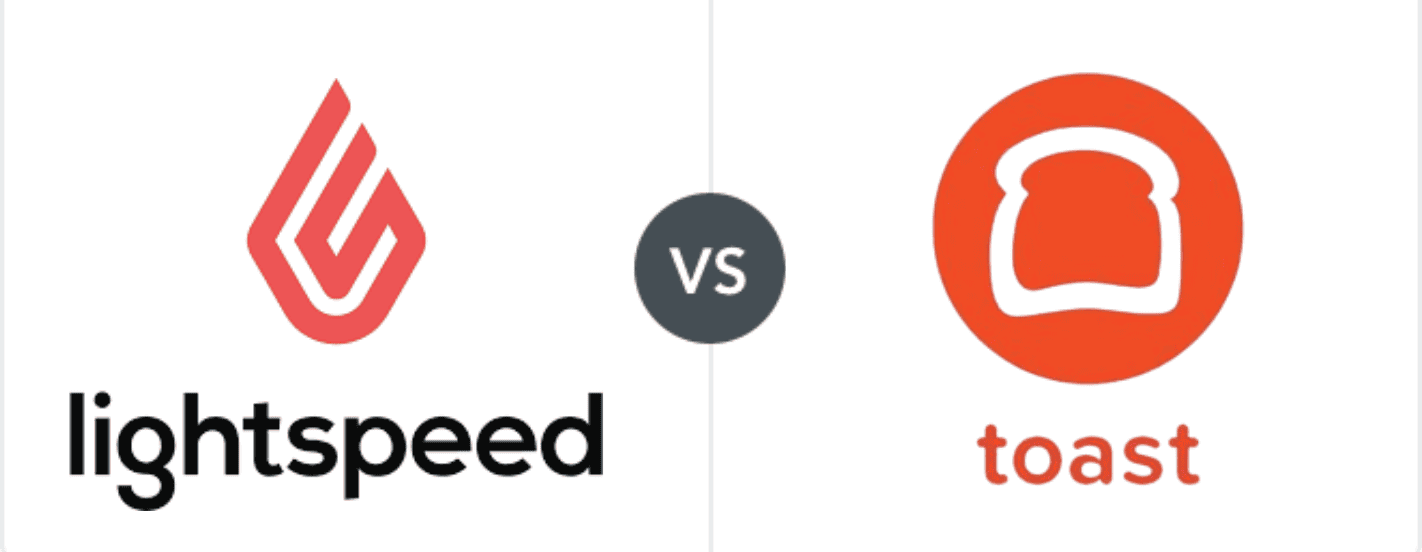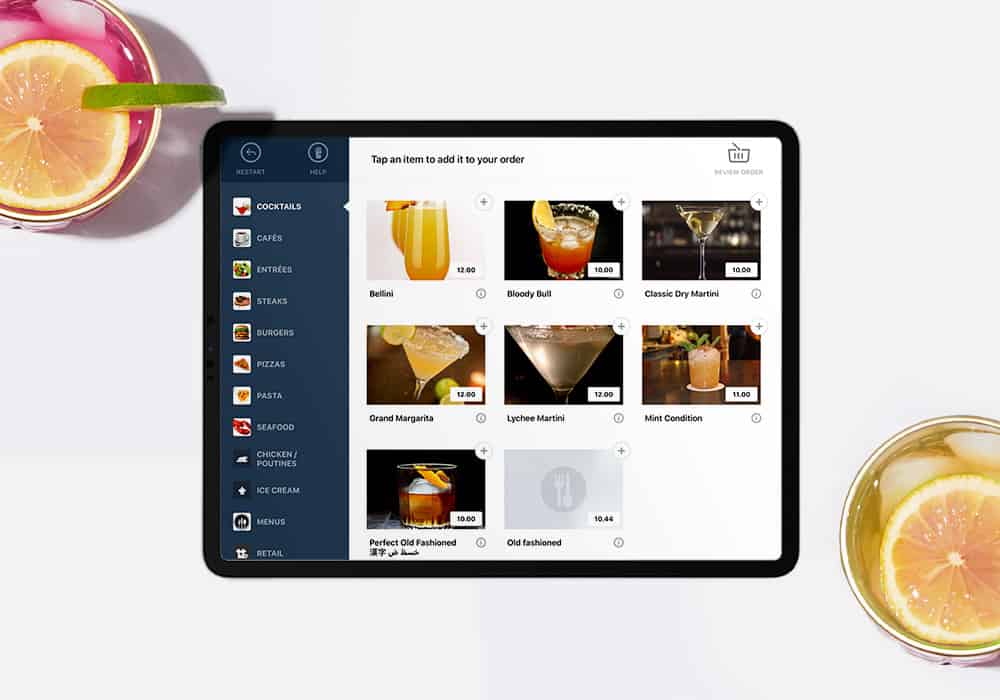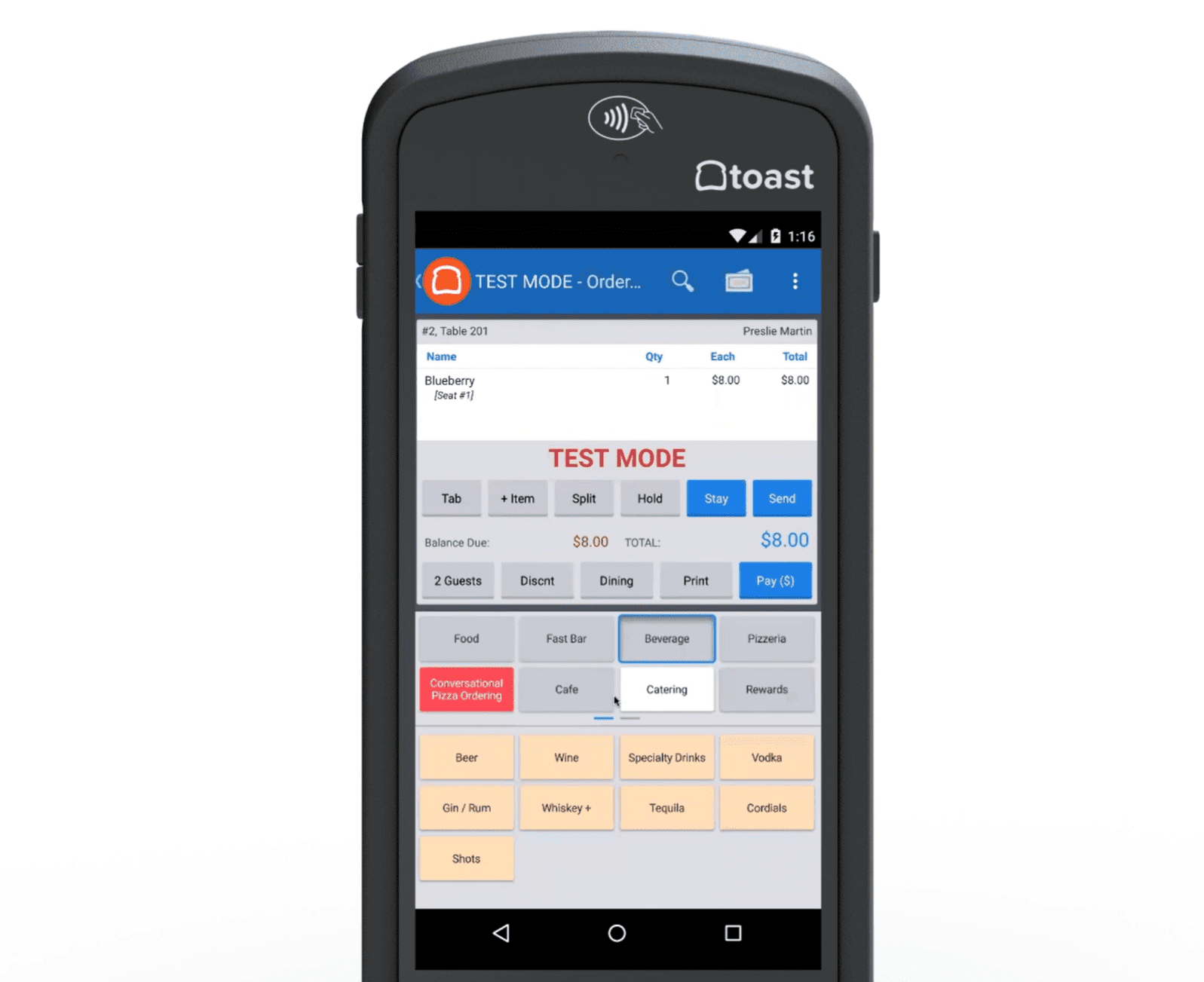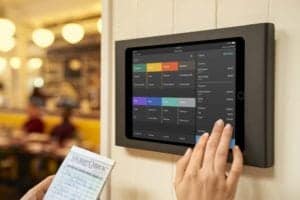These two popular POS powerhouses are great for established restaurants looking for expanded features. Discover if Lightspeed or Toast is right for you.

Lightspeed Restaurant and Toast are two popular restaurant point of sale systems (POS systems) that allow businesses to accept payments, manage a menu and inventory, and report sales data. While Lightspeed is more affordable and works well for quick-serve restaurants, Toast is a more comprehensive restaurant POS with excellent sit-down restaurant management.
Our Lightspeed versus Toast comparison examines pricing, features, POS hardware options, and customer service features to help you choose the best POS system for your business.
Lightspeed Vs. Toast: At A Glance Comparison
|
Pricing |
Hardware |
Processing fees |
Online Ordering |
Maverick Rating |
| Lightspeed |
$69-$399/mo |
Bundles available |
2.6% + $0.10 per transaction |
|
4 |
| Toast |
$0-$69/mo |
Proprietary |
2.49%-3.69% + $0.15 per transaction |
|
4 |
Lightspeed Restaurant and Toast both offer a suite of POS software and hardware designed for the specific needs of restaurants.
We recommend Lightspeed for an affordable quick-serve restaurant POS because the startup costs are low, there is a quick-serve register mode for taking orders faster, and a loyalty program is available on all plans.
Toast is best for sit-down restaurants and multi-location businesses because while it is more expensive, Toast offers more durable POS hardware, better seat and table management, a mobile POS system for tableside ordering, and add-ons like purchase order management and employee scheduling that larger businesses need to function well.
Where Lightspeed Restaurant Wins
- Lightspeed has more consistent pricing and does not force you to sign up for any long-term contracts, allowing you to start using their services at a lower financial entry point.
- Lightspeed has a wider array of features so if your restaurant is part of a hotel for example or also sells retail items, they might be the better choice.
- Although Lightspeed Payments is a solid processor, if you are locked into or simply prefer a different processor, you have that option, which Toast doesn’t provide.
Where Lightspeed Falls Short
- Lightspeed does not have the simplest interface and with all of its features and potential add-ons, it can be a little time-consuming to set up and train employees on.
- If you are needing to sign up for a bunch of additional service from Lightspeed, the cost can add up quickly.
Where Toast Wins
- Toast’s hardware is excellent, especially if you want to set up mobile or tableside ordering in your restaurant.
- Toast’s customer service remains excellent, and its representatives are extremely knowledgeable and easy to get in touch with.
- Toast’s integrations with online delivery and pick-up services are very strong and easy to set up if this is something you’re looking to add for your restaurant.
Where Toast Falls Short
- Toast’s long-term contracts are unfortunate and can be a strain on restaurant owners who don’t want to make a multi-year commitment to a POS system
- Toast’s processing fees are completely upfront and can end up being more expensive than some of its competitors.
Lightspeed Vs. Toast: Pricing Comparison
Winner: Lightspeed Restaurant
Lightspeed Restaurant is the better option because the monthly pricing plans are more transparent, payment processing fees are more straightforward and flexible, a loyalty program is included in all plans, and add-on software is more affordable.
We have to note that Toast has a pay-as-you-go plan that requires no upfront investment or monthly fees. However, the higher payment processing rates on pay-as-you-go plans usually become more expensive than a flat-rate monthly subscription.
Lightspeed Pricing
Lightspeed offers three pricing plans:
- Starter: $69/month; includes POS and loyalty program
- Essential: $189/month; includes online ordering and advanced inventory
- Premium: $399/month; includes hotel revenue management and custom software integrations
If you process payments through Lightspeed, you’ll pay 2.6% + $0.10 for in-person payments and 2.9% + $0.30 for online payments. You can integrate Lightspeed Restaurant with a third-party payment processor, but you may have to pay an extra monthly fee.
Toast Pricing
Toast offers the following plans:
- Starter Kit: $0 upfront; includes 1-2 POS terminals and higher payment processing fees
- Point Of Sale: $69+/month; pay for your hardware upfront for lower processing fees
- Build Your Own: Custom pricing; custom payment processing rate
You can only process payments through Toast. Payment processing fees range from 2.49%-3.69% + $0.15 or a custom rate depending on your plan level.
Add-ons like online ordering, gift cards, and a loyalty program cost $50-$75+/month.
Learn More: Read our Toast pricing guide for how pay-as-you-go and monthly subscription plans work.
Lightspeed Vs. Toast: Software Features
Winner: Toast
Since Toast has created an entire line of restaurant management products that integrate perfectly and more well-developed software integrations, Toast naturally wins out. Toast software includes everything Lightspeed has to offer and more.
Lightspeed Features

Lightspeed Restaurant iPad POS self-ordering tableside kiosk. (Source: Lightspeed)
Lightspeed offers a quick-serve and full-service POS interface, a loyalty program builder, and online ordering. Advanced inventory management features are great for fast-casual restaurants selling buildable items like salads or grain bowls.
Add-ons include a tableside self-serve kiosk, order-status boards so customers can view the status of their takeout orders, intuitive kitchen display screens (KDS), an in-house delivery system, and third-party delivery system integrations. Lightspeed integrates with niche software such as waitlist/reservation and hotel management software.
Toast Features

Toast Go 2 handheld POS system with built-in ordering. (Source: Toast)
Toast offers an entire line of restaurant management products, including a highly customizable online ordering platform builder, in-house and on-demand delivery through DoorDash Drive, a tipping manager, employee scheduling and payroll, catering management, retail item sales, a great gift card program, and the best POS loyalty program for restaurants.
Toast’s seat, table, customer tab, order coursing, and tableside ordering features are also more advanced than Lightspeed’s.
Lightspeed Vs Toast: Hardware
Winner: Toast
Toast is a better option for restaurant POS hardware because the company offers proprietary Android-based countertop and handheld POS hardware, self-serve kiosks, and kitchen display screens that are more heat and spill-proof than Lightspeed’s iPad POS system.
However, you are required to purchase your POS hardware from Toast, while you can purchase your own iPads and card readers, making Lightspeed a more affordable option.
Lightspeed Restaurant Hardware
Lightspeed POS, KDS, and self-serve kiosk software can all run on a $329 iPad. Card readers range from $69 for a small contactless card reader to $389 for a handheld card reader with a built-in receipt printer.
Toast Hardware
Toast offers the Toast Go 2 handheld restaurant POS system ($799), countertop POS system ($1,024), self-ordering kiosk ($1,034), and kitchen display screens ($674).
The Toast Go 2 allows servers to hold and fire orders, accept credit cards and digital wallet payments, accept tips, and choose whether to have receipts emailed or printed. Customers are prompted to join the loyalty program and redeem loyalty program points on the countertop, handheld, and self-serve kiosk POS systems.
Which Is Best For My Business?
We recommend Lightspeed for small to midsize restaurants focused primarily on quick-serve and fast-casual orders because the software is affordable, you can install it on any iPad, the inventory management is best suited for buildable items and combo meals, and a straightforward loyalty program is available on all plans.
Toast is a great option for sit-down restaurants with multiple sections, restaurants that offer catering and event management, and multi-location/franchise establishments. Toast hardware and software are great investments for established businesses looking for an all-in-one restaurant management solution with customizable general and niche features.
More: If you’re still not sure which POS system is right for you, read our guide to choosing a restaurant POS system.















